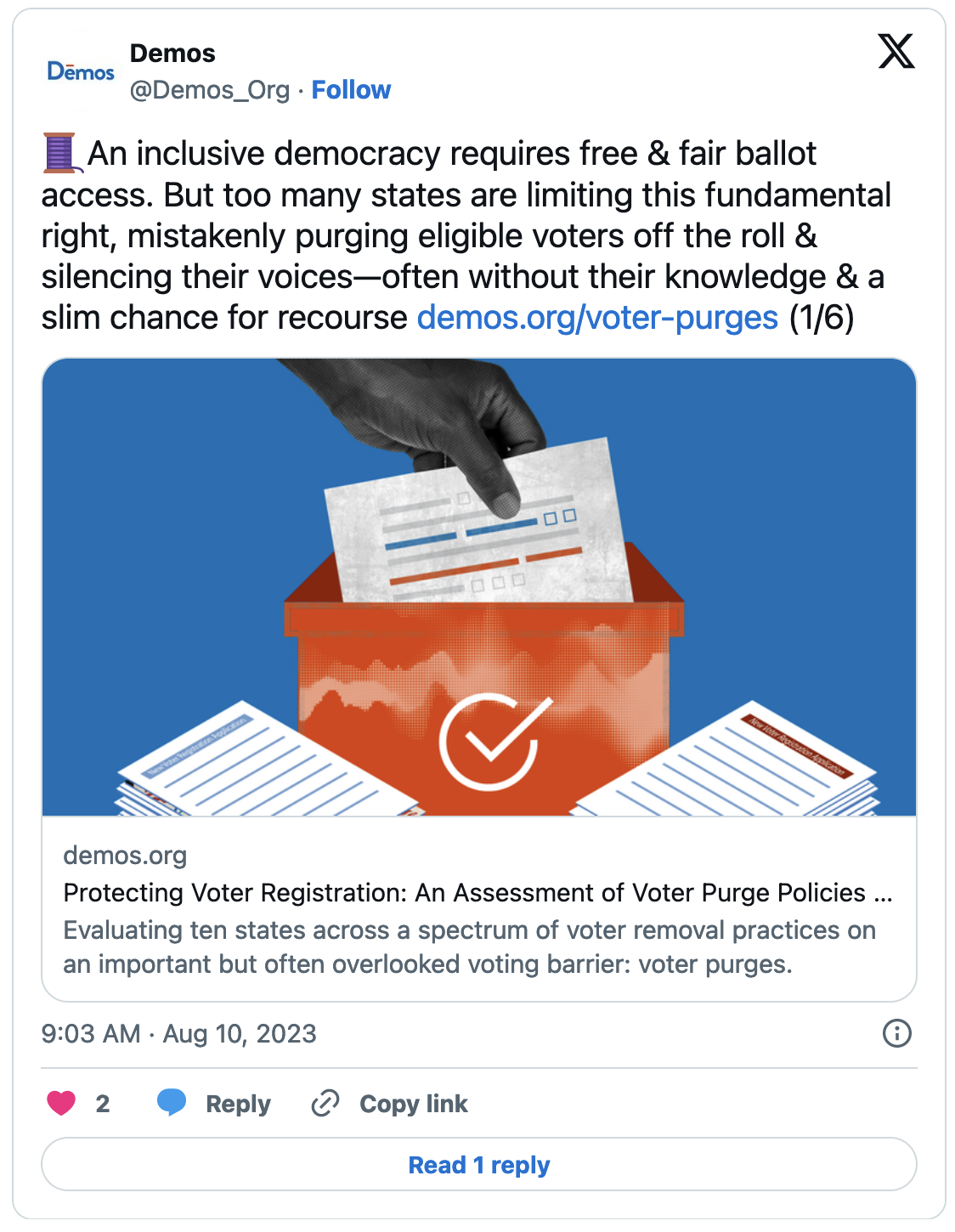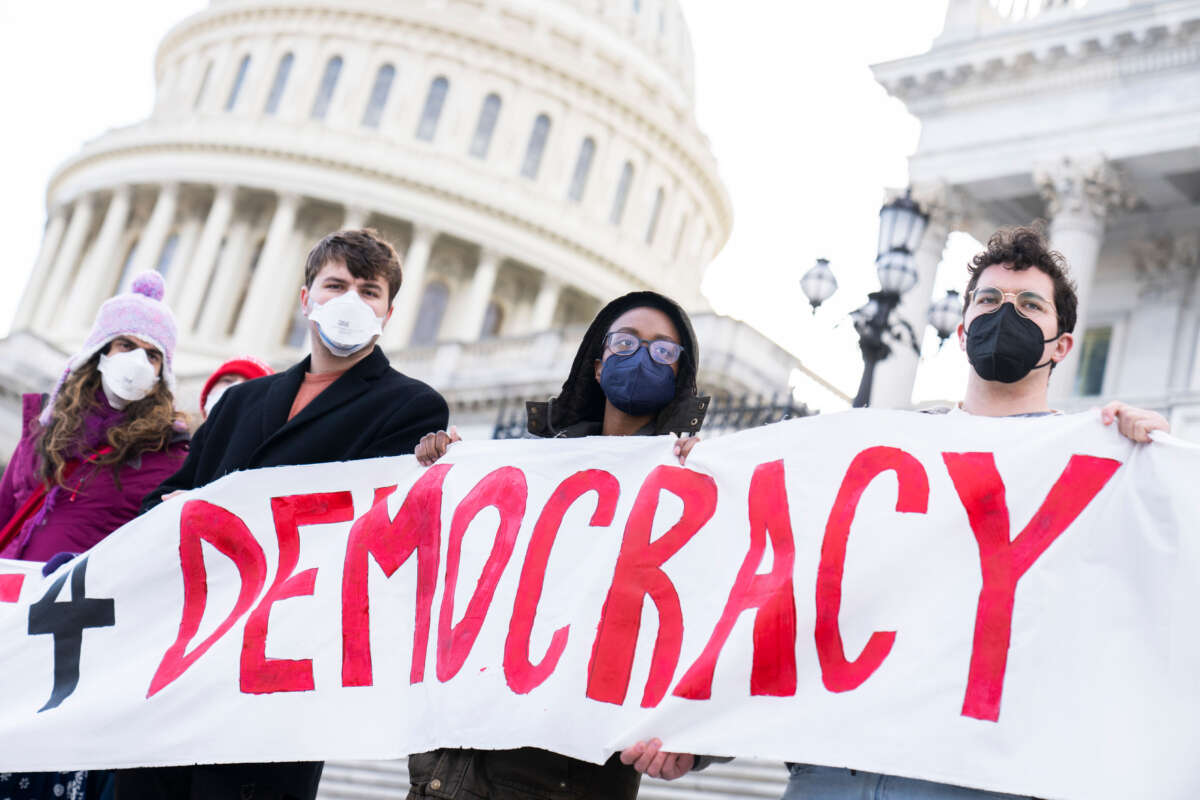Truthout is a vital news source and a living history of political struggle. If you think our work is valuable, support us with a donation of any size.
States removed more than 19 million people — or about 8.5% of the registered U.S. electorate — from voter rolls between the 2020 and 2022 electoral cycles, often via flawed practices that prevent many eligible persons from exercising their right to vote, a report released Thursday revealed.
The report — Protecting Voter Registration: An Assessment of Voter Purge Policies in 10 States — from the liberal think tank Dēmos, examines how voters are removed from electoral rolls in Arizona, California, Georgia, Indiana, Louisiana, Michigan, North Carolina, Ohio, Texas, and Wisconsin.
“Between the close of registration for the 2020 general election and the close of registration for the 2022 general election, states reported removing 19,260,000 records from their voter registration rolls,” the report notes. “This was equal to 8.5% of the total number of voters who were registered in the United States as of the close of registration for the 2022 general election.”
“Of course, some removals are necessary for the proper maintenance of voter rolls, such as for persons who have died or have moved away from their voting jurisdiction,” the authors acknowledged. “One of the most frequent reasons for purging, however, was ‘inactivity,’ or failure to respond to a confirmation notice and not voting in at least two consecutive federal general elections. This reason accounted for more than a quarter of all removals while 26.8% and 25.6% were for address change or death of the registrant, respectively.”

The report continues:
Flawed voter purge practices — such as removals for inactivity or based on inaccurate identification of felony status or citizenship status — often disproportionately target voters of color, naturalized citizens, and other communities, and can prevent many eligible persons from exercising their right to vote. In addition, too many states lack readily available data on voter purges, which prevents advocates, organizers, and voters from stopping improper purges before they happen or correcting an erroneous purge in time for an election. As a result, tens of thousands of eligible voters who have taken all the necessary steps to exercise their right to vote are wrongly prevented from making their voices heard in our democracy.
The 10 states in the report were selected “because their voter removal laws and safeguards, as well as the accessibility and transparency of their registration data, provide representative examples of the spectrum of laws and practices across the United States.”
“Additionally, many of these state legislatures are either considering bills or have recently enacted laws that impact how voters are removed from the voter rolls,” the report notes. “In the 2022 legislative session, state lawmakers introduced at least 43 bills that would allow or require problematic voter purges, and in 2023, as of the writing of this report, states are considering at least 28 additional bills.”
Dēmos graded the states on a percentage-point scale in four categories: voter removal practices, safeguards against erroneous removal, data accessibility, and data transparency. In the removal practices category, Indiana received the highest score, earning a 76% rating, while Ohio, which scored 24%, ranking last. For safeguards, Wisconsin received a 90% rating, while six states tied for last with a 20% score. North Carolina and Ohio got perfect 100% scores for data accessibility, while Indiana received a 0% rating. North Carolina and Georgia received perfect scores for data transparency; Indiana got another 0% mark.
“All 10 states must modernize their removal practices to ensure that only ineligible voters are removed from the rolls, and all need better systems to ensure that erroneously removed eligible voters can re-register and vote in the current election,” the report asserts.
“Additionally, almost all these states need improved policies to ensure that they collect and publish voter registration data in an accessible and transparent format,” the publication adds. “While we examine only a subset of states, we know from work with partners in other states that the problems identified here are not confined to these 10 states but are likely representative of issues across the entire United States.”
“Bottom line: Every examined state must improve its laws and practices to guard against improper voter registration purges,” the authors stressed.
The report offers a lengthy list of recommendations for federal and state lawmakers, election officials, and advocates to improve the voter removal process and ensure a more inclusive democracy. At the federal level, the Freedom to Vote Act was reintroduced last month after narrowly failing to pass during the 117th Congress. However, the measure has little chance of making it to President Joe Biden’s desk given Republican control of the House of Representatives.

The Dēmos report comes amid ongoing efforts by GOP-controlled state legislatures to restrict voting rights. According to the Brennan Center for Justice, a progressive public policy institute, at least 322 restrictive bills have been introduced in 45 states this year, with 13 laws enacted. The center said six of the introduced bills “would increase the risk of faulty voter purges.”
A terrifying moment. We appeal for your support.
In the last weeks, we have witnessed an authoritarian assault on communities in Minnesota and across the nation.
The need for truthful, grassroots reporting is urgent at this cataclysmic historical moment. Yet, Trump-aligned billionaires and other allies have taken over many legacy media outlets — the culmination of a decades-long campaign to place control of the narrative into the hands of the political right.
We refuse to let Trump’s blatant propaganda machine go unchecked. Untethered to corporate ownership or advertisers, Truthout remains fearless in our reporting and our determination to use journalism as a tool for justice.
But we need your help just to fund our basic expenses. Over 80 percent of Truthout’s funding comes from small individual donations from our community of readers, and over a third of our total budget is supported by recurring monthly donors.
Truthout’s fundraiser ended last night, and we fell just short of our goal. But your support still matters immensely. Whether you can make a small monthly donation or a larger one-time gift, Truthout only works with your help.
